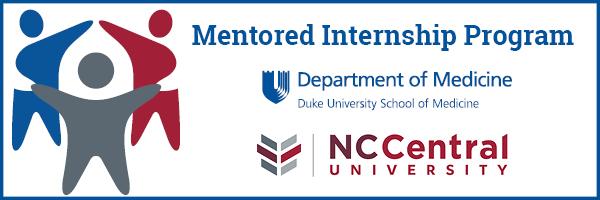
The Department of Medicine and the division of Nephrology are partnering with historically Black college and university (HBCU) North Carolina Central University (NCCU) College of Health and Sciences in a new program to give talented students an opportunity to develop mentor relationships and research/clinical exposure to fortify their early career development.
The Duke/NCCU Mentored Internship Program (MIP) pairs promising NCCU undergraduates with research faculty in Nephrology for a year-long, immersive laboratory and clinical shadowing experience.
Dr. Gentzon Hall, MD, PhD, vice chief of Diversity, Equity and Inclusion and assistant professor in the division of Nephrology, will serve as director. He will be joined by NCCU colleagues, Drs. Charles D. Johnson, professor of history, and Nina Smith, associate dean of the College of Health and Sciences.
“The goal of the program is to provide critical foundational exposure and support for aspiring, underrepresented students pursuing careers in the biomedical sciences,” Hall said. “In the long term, we expect that this immersive training experience will provide students with a sense of belonging in top-tier academic environments and equip them to make valuable contributions to the health care of historically underserved populations.”
Q: What inspired this new program and what are some of the components?
Hall: One of the major challenges threatening the career development of faculty underrepresented in medicine (URiM) is the lack of mentoring and sponsorship. These relationships are critical to the long-term success of trainees in the health professions and need to be established early in the educational experience. Initial funding will provide a trainee stipend, travel to the annual meeting of the American Society of Nephrology Kidney Week meeting, a research budget for trainees and an administrative support for MIP program leadership.
The program was created to honor the memory of Drs. Michelle Winn and Charles Johnson, whose son is a history professor at NCCU and was part of the team that built this partnership. I am a former mentee of Dr. Winn and wanted to establish a way to honor her legacy in science and promote institutional equity at Duke. Dr. Winn often emphasized the impact the Dr. Johnson had on her career, so in designing the program, we decided it would be most appropriate to honor them both.
Q: What is the goal of the partnership between DOM/Nephrology and NCCU?
Hall: We believe that Duke University’s reputation as a top-tier research and clinical training environment will be an ideal venue for talented NCCU students aspiring to careers in medicine or the biomedical sciences to gain early-career support and training. The initial program proposal was developed with input from Drs. Myles Wolf, chief of the division of Nephrology, Professor Laura Svetky in Nephrology. We then collaborated with Drs. Johnson and Smith to develop the internship.
The internship program houses two eponymous awards, the Charles Johnson Clinical Research Training Award and the Michelle P. Winn Basic/Translational Research Training Award. The inaugural Michelle P. Winn award recipient is Ms. Monique Armelle Dacanay. She is a rising senior majoring in the Biomedical Sciences at NCCU. She will be an intern in the laboratory of Dr. Opeyemi Olabisi beginning in September.
She will work in the Nephrology Lab to focus on common genetic diseases that affect African Americans, with kidney disease being the likely focus. Dr. Olabisi is an adult nephrologist and a leading authority on apolipoprotein 1 (APOL1) kidney disease. Pathogenic risk variants in APOL1 may account for a large portion of the excess burden of kidney disease in African Americans. Ms. Dacanay has some background in basic science research and an interest in kidney disease in minority communities. Dr. Olabisi’s lab studies several aspects of the molecular pathobiology of APOL1-mediated kidney disease so there will be a number of possibilities for Ms. Dacanay to consider for her project.
Q: How will MIP move medicine forward?
Hall: It addresses the specific needs of URiM trainees for early-career mentoring and research/clinical exposure. We expect that over time, this investment will contribute to addressing longstanding issues of health inequity and URiM representation in the health professions.
Q: There is a lot of excitement around the opportunities that MIP presents. Can you speak to the passion behind the program?
Hall: URiMs aspiring to careers in research and medicine face many challenges. The key to success in this environment is strong and consistent mentoring. Michelle was an outstanding mentor and I want others to experience the benefit of high-quality mentoring as I did. She often spoke of the influence that Dr. Johnson had on her career at Duke. It seems right to me to honor them both and to give an upcoming generation of trainees the opportunity to get to know them.
Q: Can you speak about how MIP will improve health outcomes in our communities?
Hall: This program is designed to address an area of critical need for the successful career development of URiM trainees and faculty in academic medicine. It is intended to provide scholars with the mentoring and early-career exposures required to equip them for careers as health professionals. We expect that this early investment will translate into the development of a confident and qualified generation of URiM professionals committed to advancing the health care of historically medically underserved populations.